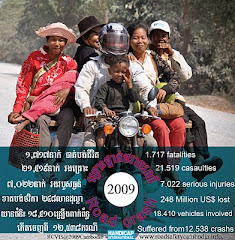DESPITE the much-touted introduction of the new helmet law - which makes protective headgear compulsory for motorbike drivers - over two weeks ago, drivers and passengers are still at risk due to a lack of regulations governing the quality of helmets sold in the Kingdom.
Safety officials have warned it could take up to a year before there is an approved safety standard for motorbike helmets, adding also that it will be several months before the helmet law applies to passengers.
The new law came into force on January 1, in a bid to reduce fatalities and serious head injuries on the roads.
Under the new law, motorbike drivers - but not passengers - must wear a helmet, or face a fine of 3,000 riels ($0.73).
But despite the government claiming to have achieved a 92 percent compliance rate in Phnom Penh, the National Culture and Social Morality Centre (NCSMC), a local NGO, warned that more than 30 percent of helmet- wearers are still putting themselves and other road users in danger by not wearing quality helmets.
Po Samnang, director of the centre, argued that there needs to be a public information campaign to raise awareness of the importance of high-quality helmets.
"Our people will suffer serious injuries in traffic accidents, as some helmets worn cannot protect their heads," he said. In some cases, motorbike riders have been seen wearing plastic construction hard hats or other inappropriate headgear as substitutes for a proper motorbike helmet, he added.
Cheap, poor-quality helmets are being sold on the streets of Phnom Penh for as little as $3.50.
Ach Heng has been selling helmets, which she sources from Thailand and Taiwan, on the streets of the capital since 1997. While she insists that her helmets are of the highest quality, she says there are no official guidelines, checks or controls on the quality of helmets on sale.
She said often the price of helmets can indicate their quality. "My helmets cost between $8 and $150, but those costing $3 or $4 are not good quality," she said.
Socheata SANN, road safety program manager at Handicap International Belgium, said it will likely take up to a year for the National Committee for Road Traffic Safety to approve a basic helmet standard for Cambodia.
"In November 2008, the government sent 10 different helmets to the United States to be tested. Of the ten helmets sent, only four were approved as being of a suitable quality," he said.
Concerns over the Kingdom's dearth of quality helmets have prompted various institutions to launch nationwide helmet campaigns that will run over the course of the coming year.
The NCSMC will hold a campaign about the new traffic law and the importance of wearing quality helmets in Phnom Penh this Sunday.
In three months time, Handicap International will launch a national television campaign accompanied by thousands of leaflets to be distributed around Phnom Penh, informing consumers of what to look for in a good helmet.
El Narin, deputy director of Phnom Penh's traffic police, said it is difficult for law enforcement officers to take action on drivers wearing poor-quality or inappropriate helmets.
"Police don't have a plan to deal with drivers who wear unsuitable helmets. We are trying to introduce helmets step by step but haven't yet defined the quality of the helmet they have to wear," he said.
So while there may now be a swarm of helmets on the roads, whether there will be a decrease in head injuries from traffic accidents remains to be seen.

Photo by: Tracey Shelton
Moto-taxi driver Bun Ly tries on a new helmet from a street-side stall in Phnom Penh last week.
Written by MOM KUNTHEAR and SARAH WHYTE
Thursday, 22 January 2009

No comments:
Post a Comment